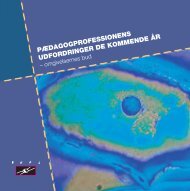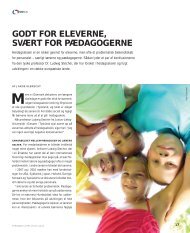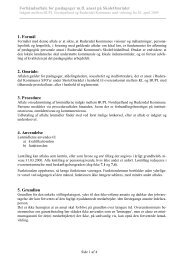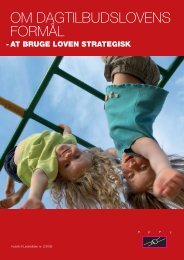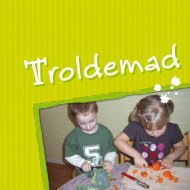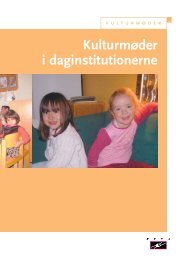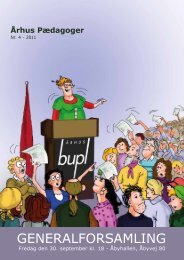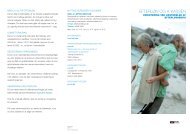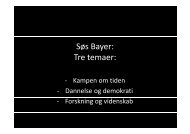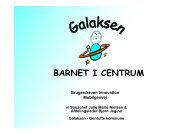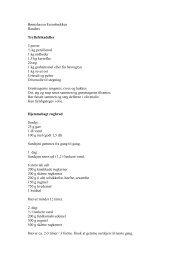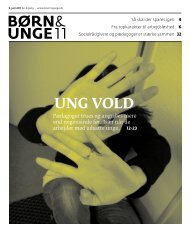THE WORK OF THE PEDAGOGUE: ROLES AND TASKS - Bupl
THE WORK OF THE PEDAGOGUE: ROLES AND TASKS - Bupl
THE WORK OF THE PEDAGOGUE: ROLES AND TASKS - Bupl
You also want an ePaper? Increase the reach of your titles
YUMPU automatically turns print PDFs into web optimized ePapers that Google loves.
COMMUNITY<br />
ATTENTION<br />
SOCIALISATION CARE<br />
FORMATION LEARNING<br />
DEVELOPMENT<br />
INDIVIDUALISM<br />
<strong>THE</strong> <strong>WORK</strong> <strong>OF</strong><br />
<strong>THE</strong> <strong>PEDAGOGUE</strong>:<br />
<strong>ROLES</strong> <strong>AND</strong> <strong>TASKS</strong>
DAY CARE CENTRES AS AN INDEPENDENT SPACE FOR<br />
CHILDREN’S LIVES TO DEVELOP IN<br />
Day care centres is the generic name for day nursery schools age<br />
0-3, kindergartens age 2-5, and day care centres that cover all age<br />
groups i.e. from age 0-10, and after-school centres age 6-10. In<br />
Denmark, the childcare centre for 0-6 year old children and the<br />
after school centre for the 6-10 year olds constitute an independent<br />
space for children’s lives to develop in communities. The day care<br />
centres are not a part of the educational system, but are considered<br />
as places where children can participate on their own terms<br />
in the creation of child life. As opposed to a lot of places in the<br />
world, there is neither traditional curriculum nor division of subjects<br />
and classes in the Danish day care centres. This, however,<br />
does not mean that the children do not benefi t from going to their<br />
day care centre. On the contrary, day care centres are a place where<br />
children engage in a different kind of activity, which is why things<br />
are organised differently than at school. Activities are initiated by<br />
the pedagogues but also by the children themselves, who will often<br />
start an activity or a play on their own initiative. There are no prescribed<br />
time spans and the activities can vary from short sequences<br />
and to children engaged at a play that can last for weeks. There are<br />
no specifi c subjects but different themes and activities are coordinated<br />
cross-curricular. Many of the activities in the day care centres<br />
challenge the child creative or physically. The day care centre is in a<br />
double sense a social meeting place: It is both a social community<br />
for children, but also a social community where children can meet<br />
across social distinctions.<br />
The concept “pedagogue” is specifi c to Denmark. The pedagogues<br />
are trained 3,5 year at Colleges and get the title: Professional<br />
Bachelor. Pedagogues have a very broad qualifi cation and are<br />
employed both in child care services, in centres for handicapped<br />
people and also inside the sector of services for elderly people.<br />
3
Most of the pedagogues work in the fi eld of early childhood education<br />
and care. In this context they are comparable to “Pre-school<br />
teachers” in other countries. In the sector of out of school care they<br />
might be compared to “Play workers” or “Recreation instructors”,<br />
and in other services they are more like “Social workers” or “Educators”.<br />
We have decided to use the concept pedagogue in order to maintain<br />
the specifi c values and attitudes of this Danish pedagogical<br />
profession to the overall development, learning and formation of<br />
children, youth and adults. Danish childcare provision is an integral<br />
and independent part of the Danish welfare society and should<br />
not be confused with the school system and formal teaching.<br />
In Denmark, as in a number of other Western countries, focus<br />
has to a large extent, been placed on globalisation. There has been<br />
an increasing focus on cross-analysis and surveys which are conducted<br />
to compare these countries school systems (for example PISA<br />
surveys). The comparisons focus on traditional knowledge such<br />
as language skills, literacy and other competencies children learn<br />
in the school system. In Denmark we experience a lot of interest<br />
from many other countries who would like to see and hear about<br />
how we have organised our welfare state especially concerning the<br />
area of childcare. We have created a day care system, which means<br />
that most children have the opportunity to attend a ”pedagogical<br />
offer”. 95% of all children in the age 3-5 years attend kindergarten<br />
and 80% of all children in the age 1-3 attend nursery school, and<br />
therefore they spend a large part of their waking hours in a day care<br />
centre. 80% of all children in the age of 6-10 have a ”pedagogical”<br />
offer of about 5 hours after their school day.<br />
BUPL wish to question whether there is a need for further effi<br />
ciency and goal orientation of childhood. On one hand BUPL<br />
believe that parents are enthusiastic about the system we have constructed,<br />
but on the other hand, we have a government that empha-<br />
4
sises the importance of Denmark being in the top of PISA surveys<br />
and other international benchmarking. The question is whether<br />
we as a pedagogical profession have been good enough at describing<br />
and communicating what pedagogues do in the Danish day<br />
care centres. In this booklet, we offer a description of what pedagogues<br />
do, and why we think it is important that day care centres<br />
not become a part of the education system, but are kept as special<br />
space for children’s lives to develop within.<br />
<strong>THE</strong> DEVELOPMENT <strong>OF</strong> <strong>THE</strong> COVERAGE <strong>OF</strong> DAY CARE<br />
IN PERCENTAGE FROM 1994-2005<br />
100<br />
95<br />
90<br />
85<br />
80<br />
75<br />
70<br />
65<br />
60<br />
55<br />
50<br />
1994<br />
1995<br />
1996<br />
1997<br />
1998<br />
1999<br />
Source: Statitics Denmark<br />
Explanation to fi gure 1: The coverage of day care describes the amount of<br />
children in the given age group enrolled in day care centres, child minding<br />
and after school centres.<br />
2000<br />
2001<br />
2002<br />
2003<br />
2004<br />
2005<br />
1-2 year olds 3-5 year olds 6-9 year olds<br />
5
<strong>PEDAGOGUE</strong>S CREATE A FUN, SAFE <strong>AND</strong> CHALLENGING<br />
EVERYDAY ENVIRONMENT FOR CHILDREN<br />
In Denmark there are 60,000 pedagogues, who daily perform a<br />
professional pedagogical task with children. Pedagogues have the<br />
responsibility of creating ”pedagogical” conditions and settings<br />
that are characterised by experiences, zest for life, commitment, interest,<br />
and care. ”The pedagogues” most important job is to enable<br />
the children attending the centres to have a secure, fun and challenging<br />
experience. Through time there have been many discussions<br />
about how the pedagogical work should be described. This<br />
booklet gives an account of some of the crucial pedagogic notions<br />
and understandings, which describe the direct work with children.<br />
The booklet does not describe under which circumstances and settings<br />
that the pedagogical work develop and evolves in relation to<br />
(for example the economic ressourcers). The intention is, that the<br />
booklet can create a basis for a discussion of the foundations of<br />
pedagogical work, and how the pedagogical challenges in every day<br />
life can be solved with an awareness of the diversity of pedagogical<br />
work as a whole. This, also include the circumstances and frames<br />
present at the individual centre.<br />
NOT EVERYBODY CAN, <strong>PEDAGOGUE</strong>S CAN<br />
Pedagogues undertake a professional pedagogic task, based on the<br />
subject qualifi cations achieved through the Professional Bachelor.<br />
The education takes 3,5 years and is based on alternation and interaction<br />
between theory and practice. The work as a pedagogue is<br />
based on personal competencies and an awareness of ones own<br />
norms and values. Pedagogues professional expertise implies<br />
both theoretical and practical knowledge of children’s´ development,<br />
play, friendship and confl icts. The professional expertise encompasses<br />
knowledge of pedagogical methods and tools and also<br />
ethical considerations. Pedagogues have an overall perspective on<br />
6
childrens’ lives and perform a work characterised by many different<br />
tasks and functions.<br />
BUPL believes it is essential to defi ne and to make more visible,<br />
the essence of pedagogical work, and thereby make more transparent,<br />
what pedagogues do every day in the Danish centres and<br />
what pedagogues responsibilities are. The booklet is to be seen as<br />
BUPL’s suggestion to an overall understanding of the the pedagogue’s<br />
work and what basic tasks exist within all types of pedagogical<br />
work with the focus on the direct work with children.<br />
A MODEL <strong>OF</strong> <strong>THE</strong> BASIC CONCEPTS IN <strong>THE</strong> ”PEDAGOGICAL”<br />
<strong>WORK</strong> WITH CHILDREN<br />
The model mentioned below outlines some of the fundamental<br />
concepts, which describe the work of the pedagogue with a focus<br />
on their relationship with the child or the young person. The object<br />
of the model is to describe the professional pedagogical practice<br />
holistically and with it contribute to the understanding of the pedagogical<br />
work as a question of “either” rather than “either or”, which<br />
many other descriptions of the pedagogical work result in.<br />
In Denmark as well as internationally there is an ongoing discussion<br />
about the relation between attention and development.<br />
Attention is not just passive looking after, but also active care. It is<br />
an obligation for the day care centre to embrace all children in the<br />
centre where children have to adjust to each other. Development<br />
can be seen as a task that consciously seeks to shape and teach<br />
children, both tangible skills and competencies and also enables<br />
them to participate in life in modern society.<br />
Another basic debate concerning the pedagogical work is to what<br />
extent it is the individual or the community that is to be used as a<br />
starting point in care. This notion of the individual and community<br />
has among other ways often been described in terms of ”Childcentred<br />
pedagogy” versus ””Civic pedagogy”. The modern peda-<br />
7
gogue has to ensure a community, where children with diverse<br />
backgrounds, gender and age can be brought to function together.<br />
At the same time, we as pedagogues must be aware of the individual<br />
child’s possibilities and potentials, and whether the child has<br />
a need for extra effort and attention.<br />
MODEL FOR PEDAGOGICAL TASK IN DAY CARE CENTERS<br />
COMMUNITY<br />
The model shows four basic notions and four central areas that can<br />
describe the pedagogical tasks: Care (take care of), socialisation (to<br />
and in communities), formation (for citizenship and democracy)<br />
and learning (development of individual skills). For example the<br />
model illustrates that the ”pedagogical” task is not simply about<br />
8<br />
ATTENTION<br />
SOCIALISATION CARE<br />
FORMATION LEARNING<br />
DEVELOPMENT<br />
INDIVIDUALISM
development, but also about looking after, that pedagogues not<br />
only put the individual child in the centre, but also take care of the<br />
interests of the community.<br />
Pedagogical work cannot only be described or understood onedimensionally,<br />
but also has to be described and understood as something<br />
with several dimensions.<br />
<strong>PEDAGOGUE</strong>S LOOK AFTER CHILDREN<br />
Care describes the relationship between pedagogues and the<br />
children in an accommodating, considerate and responding way<br />
and the assurance that the child is safe and secure while at the<br />
institution. Professional care implies awareness and empathy towards<br />
the child needs. Care has several aspects which are interlaced,<br />
and it is necessary that the pedagogue must be aware of and<br />
has responsibility for all these aspects of care:<br />
1. The emotional contact and social interaction, that the child takes<br />
part in. For example you show interest in the children and relate to<br />
them in a way that expresses that you like them, and that you relate<br />
actively to their needs, signals and development (psychologically)<br />
2. Children’s physical well being (care and handling children’s physical<br />
needs) in relation to the childs need, signals and development<br />
(physically). For example you ensure the child gets the needed rest<br />
or ensure that, the child exercise and use their body.<br />
3. To show interest and commitment in what interests the child.<br />
For example you listen, understand and enter the thoughts, questions<br />
and activities that are occupying the childrens´ minds. This<br />
also implies for example knowledge about and interest in the current<br />
children cultures and modes of expression, their problems<br />
and fi elds of interests.<br />
9
To provide care constitutes a large and important part of the time<br />
pedagogues spend with children, and to receive care is important<br />
to all children regardless of their age. Care and looking after relates<br />
to those social conditions, that determine childrens need to<br />
be taken care of in institutions, so they will have a safe place to be<br />
and not come to harm. Care is furthermore the basis for children<br />
and young people’s psychological and physical well being and is<br />
important for their further journey into life. Society’s responsibility<br />
for its childrens is among other things realised through care.<br />
To provide care for children, can as a whole be described as taking<br />
care of and attending to children’s emotional, physical and cognitive<br />
development.<br />
<strong>PEDAGOGUE</strong>S CREATE <strong>THE</strong> FRAME<strong>WORK</strong> FOR ACTIVE <strong>AND</strong><br />
CHALLENGING COMMUNITIES FOR CHILDREN<br />
Socialisation covers the aspects when pedagogues educate the<br />
children to function within the framework the centres create for<br />
the children’s social life regarding both the interaction between<br />
children, but also between the children and pedagogues. In the<br />
centres children often encounter public life and a series of societal<br />
contexts are passed on through the way the centre is organised.<br />
This means that the child encounters and can relate to the way<br />
the everyday life is organised and the way the centre through its<br />
functions works as a community with norms and values. The crux<br />
of socialisation is the process which contributes to the individual<br />
becoming part of a community. The existing community in centres<br />
has two aspects: The close and local communities which mean<br />
that the child or the young people have to be able to get on with<br />
the children they spend every day with and also by participating in<br />
the life in the centre where they socialise with the greater community<br />
(society). The task for the pedagogues is to create a framework<br />
for children’s lives, where they can meet across social boundaries.<br />
10
”The pedagogues” contribute both consciously and subconsciously<br />
to the socialisation and education of children, and help them form<br />
the cultural norms or “codes” that are essential for social and moral<br />
actions. This means, that children are educated to respect and conform<br />
to different rules and demands enabling us to thrive together<br />
in a community.<br />
The pedagogues create the framework for the day to day structure<br />
in time and space and in this way also contribute to which<br />
kind of communities are considered as appropriate for the children<br />
they are dealing with. For example in what way the rooms are decorated,<br />
when to eat, when to listen to music, what activities are<br />
prioritised, how to treat each other and so on. In the creation of this<br />
framework of challenging communities the pedagogues contribute<br />
to ensuring that children are socialised and prepared to get on in<br />
social matters throughout life.<br />
<strong>PEDAGOGUE</strong>S CONTRIBUTE TO CHILDREN’S DEVELOPMENT-<br />
<strong>AND</strong> LEARNING PROCESSES<br />
Learning covers the aspects that pedagogues contribute to the development<br />
of different skills and knowledge in the individual child<br />
through planned activities, but also by creating the framework for<br />
informal learning to occur. There are different approaches to learning<br />
and also learning processes can be described and understood<br />
in a series of ways: For example one can differentiate between cognitive,<br />
emotional and physical learning. Furthermore learning and<br />
learning processes are encompassed by the social conditions and/<br />
or institutional relations the child is a part of. It wasn´t until 2004<br />
that a law about a pedagogical curriculum was implemented in the<br />
day care centres (0-6 years) in Denmark. In this it is described,<br />
what areas the children need to be acquainted with in their day care<br />
centre. Furthermore it is important to point out, that learning is<br />
not only to be developed through deliberate and planned courses,<br />
11
ut equally takes place informally and is learned through different<br />
social contexts.<br />
However children (and adults) learn, when they get the opportunity<br />
to be active, responsible and have the opportunity to participate<br />
in different situations of the every day life of the institution.<br />
Different activities, plays and different ways of interacting<br />
and are helping to develop different skills and knowledge areas.<br />
Pedagogues have the responsibility to ensure, that children have<br />
the opportunity to experiment, investigate, try out and experience<br />
via play, and other activities and being together and thereby ensure<br />
that children are challenged and experience different learning processes<br />
throughout their life in the institution.<br />
<strong>PEDAGOGUE</strong>S CREATE A FRAME<strong>WORK</strong> FOR CHILDREN FOR-<br />
MATION PROCESS AS DEMOCRATIC CITIZENS<br />
Formation in the pedagogical work covers pedagogues creation of<br />
the framework to give the children a background and ability to relate<br />
to and to act ethically in the society they live in.<br />
Through formation children both encounter knowledge and enlightenment.<br />
They encounter the ability to apply knowledge and<br />
skills and consequently experience what kinds of people are formed<br />
through this. Formation points the attention to the participation<br />
of the children and the possibility of self-fulfi lment and through<br />
that, skills are obtained that allow them to learn to make choices. It<br />
is about teaching children to investigate and understand the world<br />
and reality that they live in and teach them to discuss and take a<br />
stand on values. It is essential that pedagogues meet children with<br />
understanding and support, and children get the opportunity to<br />
critically express their opinion and the opportunity to test and experiment<br />
with different ways of solving tasks and confl icts.<br />
Furthermore formation is about children’s development of selfconfi<br />
dence and possibilities in the community as well as their emo-<br />
12
tional development. It is also about helping them become capable<br />
of acting socially responsible and through this contribute to ensure<br />
and develop the social coherence in society. To summarise it<br />
is about what children are and how they become active participants<br />
in decisions concerning them as citizens in a democratic society.<br />
Pedagogues are responsible for enabling children to actively, responsibly<br />
and constructively take part in social life and by this contribute<br />
to promote solidarity democracy and humanity in society.<br />
13
PUBLISHED BY BUPL APRIL 2006<br />
BLEGDAMSVEJ 124, 2100 KØBENHAVN Ø, DENMARK<br />
WWW.BUPL.DK<br />
DO YOU WANT TO KNOW MORE?<br />
If you want to read more about the Danish Day Care centres and BUPL,<br />
you can fi nd more information in the pedagogical profi le of BUPL or the<br />
booklet about BUPL.<br />
BUPL – The Danish National Federation of Early Childhood Teachers and<br />
Youth Educators – is the trade union for the trained staff – the pedagogues<br />
– in nurseries, kindergartens, age-integrated childcare centres, out of<br />
school care and leisure time centres as well as leisure time and youth<br />
clubs.<br />
BUPL organise more than 95% of all pedagogues in the Union. The aims<br />
of BUPL is to defend the professional rights of the pedagogues both in the<br />
fi eld of salary and working conditions as well as the quality of education<br />
and care in the different types of child care services.



